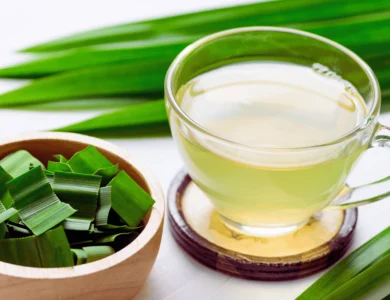
Welcome to our article on the calming effects of Valerian Root Tea. If you struggle with sleep issues or anxiety, you’ve likely heard about this popular herbal remedy. Valerian root tea is known for its natural sleep aid properties and its potential benefits for anxiety relief. In this article, we’ll explore how Valerian root tea works, its effectiveness for sleep, its use as a natural remedy for anxiety, safety considerations, and other forms and uses of Valerian. Let’s dive in!
Valerian root tea has been used for centuries as a herbal remedy for insomnia. Its calming effects on the body can help promote better sleep and reduce the time it takes to fall asleep. Many people prefer using Valerian root tea as a natural alternative to prescription sleep aids, as it tends to have fewer side effects. Additionally, Valerian root tea is believed to have benefits for anxiety, making it a versatile herbal remedy for those seeking relief from sleeplessness and stress.
How Does Valerian Root Tea Work?
The exact mechanism of action of Valerian root tea is not fully understood, but it is thought to work by increasing the levels of gamma-aminobutyric acid (GABA) in the brain. GABA is a neurotransmitter that helps regulate nerve impulses and promotes relaxation. By boosting GABA levels, Valerian root tea has a calming effect on the central nervous system, aiding in relaxation and sleep. It may also have anti-inflammatory properties and impact serotonin receptors, which are involved in mood and sleep regulation.
Is Valerian Root Tea Effective for Sleep?
Several studies have shown that Valerian root tea can improve sleep quality and reduce the time it takes to fall asleep. Regular consumption of Valerian root tea has been associated with increased sleep duration and improved sleep efficiency. However, it’s important to note that the effects may vary from person to person, and consistent use over a few weeks may be needed to see significant improvements. As with any herbal remedy, Valerian root tea may not be suitable for everyone, so it’s best to consult with a healthcare professional before use.
Valerian Root Tea for Anxiety Relief
In addition to its sleep benefits, Valerian root tea has been traditionally used as an herbal remedy for anxiety relief. It is believed to have anxiolytic properties that can help calm the mind and alleviate symptoms of anxiety, such as restlessness and muscle tension. The tea acts on GABA receptors in the brain, similar to some anti-anxiety medications. If you’re looking for a natural and safe option to manage anxiety, Valerian root tea may be worth considering.
Safety and Side Effects of Valerian Root Tea
Valerian root tea is generally considered safe when consumed in moderate amounts for short periods. However, some individuals may experience side effects such as headache, dizziness, stomach problems, or sleeplessness. Pregnant or breastfeeding individuals should avoid Valerian root tea, as its safety in these cases is not established. Those with liver disease should also refrain from using it. Additionally, Valerian root tea may interact with certain medications, so it’s crucial to consult with a healthcare professional before use.
Considerations and Precautions for Using Valerian Root Tea
Before incorporating Valerian root tea or any herbal supplement into your routine, it’s essential to consider a few precautions. Valerian root tea is not meant to replace medical treatment or prescribed medications for chronic insomnia or severe anxiety. Consulting with a healthcare professional is crucial, especially if you have underlying medical conditions or are taking other medications. They can provide personalized advice and help determine whether Valerian root tea is the right option for you. Adhering to recommended dosage instructions and not exceeding the recommended amount is also important for safe usage.
Other Uses and Forms of Valerian
In addition to its use in tea form, Valerian root is available in various other forms such as capsules, tinctures, and extracts. These forms offer standardized dosages and convenience for daily use. Valerian root is believed to have other health benefits beyond sleep and anxiety, including alleviating stomach cramps, migraines, tiredness, and PMS symptoms. However, further research is needed to understand the full extent of these benefits and their mechanisms of action. As always, consult with a healthcare professional before using Valerian root for specific conditions.
Final Thoughts on Valerian Root Tea
Valerian root tea can be a natural and effective option for those seeking better sleep and relief from anxiety. While it is generally safe for most people, individual responses may vary, and consulting with a healthcare professional is crucial before use. Valerian root tea should be seen as part of a holistic approach to sleep and anxiety management, complemented by a healthy lifestyle and good sleep hygiene. Remember, if you have any concerns or persistent sleep or anxiety issues, it’s always best to seek professional help.
How Does Valerian Root Tea Work?
Valerian root tea is known for its relaxation benefits and the health benefits of valerian. While the exact mechanism of action is not fully understood, it is believed to work by increasing the levels of gamma-aminobutyric acid (GABA) in the brain. GABA is a neurotransmitter that helps regulate nerve impulses.
By increasing GABA levels, valerian root tea has a calming effect on the central nervous system, promoting relaxation and better sleep. This is why valerian tea is often used as a natural sleep aid for individuals experiencing trouble falling asleep or staying asleep.
Valerian root tea also has potential anti-inflammatory properties and may inhibit the expression of certain genes. Additionally, it may impact serotonin receptors, which are involved in mood and sleep regulation. These combined effects contribute to the overall relaxation benefits of valerian root tea.
Overall, valerian root tea’s impact on GABA, inflammation, gene expression, and serotonin receptors work together to promote a sense of calmness and relaxation, making it a popular choice for those looking for natural remedies for sleep and relaxation.
To better understand how valerian root tea promotes relaxation and better sleep, let’s delve into the details:
- Increased GABA Levels: Valerian root tea is believed to increase the levels of GABA in the brain. GABA is a neurotransmitter that inhibits nerve activity, helping to soothe and calm the central nervous system.
- Anti-Inflammatory Properties: Valerian root tea may possess anti-inflammatory properties, which can help ease inflammation in the body and reduce associated discomfort.
- Inhibition of Gene Expression: Valerian root tea may inhibit the expression of certain genes, potentially leading to calming effects on the body and mind.
- Impact on Serotonin Receptors: Serotonin is a neurotransmitter that plays a role in regulating mood and sleep. Valerian root tea may have an impact on serotonin receptors, contributing to its relaxation benefits.
By acting on these different mechanisms, valerian root tea creates a calming and soothing effect, helping individuals relax and achieve better sleep quality.
Is Valerian Root Tea Effective for Sleep?
Valerian root tea has been proven to be effective in improving sleep quality and reducing the time it takes to fall asleep. Numerous studies have shown that regular consumption of valerian root tea can lead to better sleep outcomes, including increased sleep duration and improved sleep efficiency.
Valerian root tea is often chosen as an alternative to prescription sleep aids due to its favorable safety profile and minimal side effects. Unlike prescription medications, valerian root tea offers a natural and holistic approach to sleep improvement without the risk of dependency or morning grogginess.
It is essential to note, however, that the effects of valerian root tea may vary from person to person. While some individuals may experience immediate improvements in sleep after consuming the tea, others may need several weeks of consistent use to notice significant changes.
Preparing valerian root tea is a simple process that can be easily incorporated into your nighttime routine. To make the tea, steep 1 to 2 teaspoons of dried valerian root in a cup of hot water for 5 to 10 minutes. For optimal results, it is recommended to drink the tea 1 to 2 hours before bedtime, allowing enough time for the valerian compounds to take effect.
Valerian Root Tea for Anxiety Relief
Valerian root tea has long been used as a natural remedy for anxiety and stress relief. This herbal tea is believed to have anxiolytic properties that help calm the mind and promote relaxation. Just like certain anti-anxiety medications, valerian root tea acts on GABA receptors in the brain to reduce anxiety symptoms. Numerous studies have shown that valerian root tea can effectively alleviate both the physical and psychological symptoms of anxiety, such as restlessness, nervousness, and muscle tension.
Valerian root tea provides a natural and safe alternative for individuals seeking anxiety relief. By incorporating this herbal remedy into your daily routine, you can experience a sense of calm and tranquility without the potential side effects associated with prescription medications. Whether you’re looking for a standalone treatment or a complementary approach to manage anxiety, valerian root tea can be a valuable addition to your self-care regimen.
As with any anxiety treatment, it’s important to note that individual responses may vary. It’s always advisable to consult with a healthcare professional before using valerian root tea, especially if you have underlying medical conditions or are taking other medications. They can provide personalized advice and help determine if valerian root tea is a suitable option for you.
Benefits of Valerian Root Tea for Anxiety Relief:
- Promotes relaxation and calms the mind
- Reduces restlessness and nervousness
- Alleviates muscle tension
- Offers a natural and safe alternative to prescription medications
By incorporating valerian root tea into your daily routine, you can harness the power of this herbal remedy to effectively manage anxiety and reduce stress levels. Remember to always prioritize your well-being and seek professional guidance when needed.
Safety and Side Effects of Valerian Root Tea
Valerian root tea is a widely used herbal remedy known for its calming effects on the mind and body. While valerian root tea is generally considered safe, it is important to be aware of potential side effects and precautions.
Potential Side Effects
While most people can safely enjoy valerian root tea, some individuals may experience certain side effects. Common side effects may include headaches, dizziness, stomach problems, and sleeplessness. It is important to pay attention to your body’s response and adjust the dosage if needed.
Special Considerations
It is not recommended to consume valerian root tea if you are pregnant or breastfeeding, as there is limited research on its safety for these populations. Additionally, individuals with liver disease should avoid valerian root tea, as it may interact with the condition.
Interactions with Medications
Valerian root tea may interact with certain medications, including sleep aids, benzodiazepines, and alcohol. It is important to consult with a healthcare professional before using valerian root tea if you are currently taking any medications, to ensure there are no potential interactions.
It’s always a good idea to consult with a healthcare professional before incorporating valerian root tea into your routine, especially if you have any underlying medical conditions or are taking other medications. They can provide personalized advice based on your specific circumstances.
Valerian root tea can be a natural and effective option for promoting relaxation and alleviating sleep issues and anxiety. By being aware of potential side effects and taking appropriate precautions, you can safely enjoy the health benefits of valerian root tea.
Considerations and Precautions for Using Valerian Root Tea
Before using valerian root tea or any other herbal supplement for sleep or anxiety, it is important to consider certain precautions. Valerian root tea should not be used as a substitute for medical treatment or prescribed medications for chronic insomnia or severe anxiety. It is always best to consult with a healthcare professional before using valerian root tea, especially if you have underlying medical conditions or are taking other medications. They can provide personalized advice and help determine if valerian root tea is a suitable option for you. It is also important to follow the recommended dosage instructions and not exceed the recommended amount. Consulting a healthcare professional can help ensure safe and effective usage of valerian root tea.
- Do not use valerian root tea as a replacement for medical treatment or prescribed medications for chronic insomnia or severe anxiety.
- Consult with a healthcare professional before using valerian root tea, especially if you have underlying medical conditions or are taking other medications.
- Follow the recommended dosage instructions and do not exceed the recommended amount of valerian root tea.
Valerian root tea can interact with certain medications, so it is crucial to disclose all medications you are taking to your healthcare professional.
Consult a Healthcare Professional
A healthcare professional can provide personalized advice and guidance on whether valerian root tea is the right choice for you. They can help you understand the potential benefits and risks, taking into account your individual circumstances. It is important to be open and honest about your medical history, current medications, and sleep or anxiety concerns. They may also suggest alternative treatments or strategies that may be more suitable for your specific needs.
Other Uses and Forms of Valerian
In addition to its use in tea form, valerian root is available in various other forms, such as capsules, tinctures, and extracts. These forms offer the convenience of standardized dosages and can be easily incorporated into daily routines.
Apart from its calming effects on sleep and anxiety, valerian root is also believed to have other health benefits. It has been used to alleviate stomach cramps, migraines, tiredness, and PMS symptoms. However, more research is needed to fully understand the extent of these benefits and their mechanisms of action.
It is important to consult with a healthcare professional before using valerian root in any form for these specific conditions.
- Stomach Cramps: Valerian root may help relieve stomach cramps and discomfort. It is believed to have antispasmodic properties that can help relax the muscles in the digestive system.
- Migraines: Some individuals have reported that valerian root can help reduce the frequency and intensity of migraines. Its calming effects may help relieve headache symptoms.
- Tiredness: Valerian root is known for its ability to promote relaxation and restful sleep. By improving sleep quality, it can help reduce fatigue and increase energy levels during the day.
- PMS Symptoms: Valerian root may help alleviate symptoms commonly associated with premenstrual syndrome (PMS), such as mood swings, irritability, and cramps. Its calming and mood-stabilizing effects may provide relief during this time.
While these potential benefits are promising, it is important to note that individual experiences may vary, and further research is needed to establish the effectiveness of valerian root for these specific conditions. Always consult with a healthcare professional before starting any new herbal supplement regimen.
Final Thoughts on Valerian Root Tea
Valerian root tea is a natural sleep aid and anxiety relief option that has been used for centuries due to its calming effects on the body and mind. While it is generally considered safe, it is important to note that valerian root tea may not be suitable for everyone, and individual responses may vary.
Before incorporating valerian root tea into your routine, it is crucial to consult with a healthcare professional, especially if you have underlying medical conditions, are pregnant or breastfeeding, or are taking other medications. They can provide personalized advice and help determine if valerian root tea is a suitable option for you.
Valerian root tea should be used as part of a holistic approach to sleep and anxiety management, which includes maintaining a healthy lifestyle, practicing good sleep hygiene, and seeking professional help when needed. Remember, everyone’s journey to better sleep and reduced anxiety is unique, so it’s essential to find the right strategies and tools that work best for you.
FAQ
Is valerian root tea an effective natural sleep aid?
Yes, valerian root tea has been used for centuries to promote better sleep and reduce anxiety. Studies have shown that valerian root may help improve sleep quality and reduce the time it takes to fall asleep.
How does valerian root tea work?
The exact mechanism of action is not fully understood, but it is believed to work by increasing the levels of gamma-aminobutyric acid (GABA) in the brain. GABA is a neurotransmitter that helps regulate nerve impulses, promoting relaxation and better sleep.
Can valerian root tea be used as an alternative to prescription sleep aids?
Yes, valerian root tea is often used as an alternative to prescription sleep aids due to its favorable safety profile and fewer side effects.
Can valerian root tea be used for anxiety relief?
Yes, valerian root tea has anxiolytic properties that can help calm the mind and promote relaxation, making it a natural and safe option for anxiety relief.
What are the safety and side effects of valerian root tea?
Valerian root tea is generally considered safe when consumed in moderate amounts for short periods of time. However, it may cause side effects such as headache, dizziness, stomach problems, and sleeplessness. It may also interact with certain medications.
What precautions should I take when using valerian root tea?
Before using valerian root tea or any herbal supplement, it is important to consult with a healthcare professional, especially if you have underlying medical conditions or are taking other medications. They can provide personalized advice and ensure safe usage.
Are there other forms of valerian available?
Yes, valerian root is available in various forms, such as capsules, tinctures, and extracts, offering standardized dosages and convenience.
Is valerian root tea beneficial for any other conditions?
Valerian root has been used to alleviate stomach cramps, migraines, tiredness, and PMS symptoms, but further research is needed to fully understand its extent of benefits.
Can valerian root tea be a natural sleep aid?
Yes, valerian root tea can be a natural and effective option for individuals seeking better sleep and anxiety relief. However, it may not be suitable for everyone, and consultation with a healthcare professional is advised.




